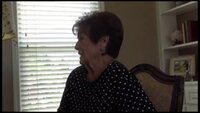| Title |
Brewster, Elizabeth OH19_006 |
| Creator |
Weber State University, Stewart Library: Oral History Program. |
| Contributors |
Brewster, Elizabeth, Interviewee; Harris, Kandice, Interviewer; Kenner, Marina, Video Technician |
| Description |
The Beyond Suffrage Project was initiated to examine the impact women have had on northern Utah. Weber State University explored and documented women past and present who have influenced the history of the community, the development of education, and are bringing the area forward for the next generation. The project looked at how the 19th Amendment gave women a voice and representation, and was the catalyst for the way women became involved in the progress of the local area. The project examines the 50 years (1870-1920) before the amendment, the decades to follow and how women are making history today. |
| Abstract |
The following is an oral history interview with Elizabeth Brewster, conducted on June 27, 2019, in her home, by Kandice Harris. Elizabeth discusses her life, her memories at Weber State University, and the impact of the 19th Amendment. Marina Kenner, the video technician, is also present during this interview.; The following is a video clip of an oral history interview with Elizabeth Brewster conducted on June 27, 2019. In this video clip, Elizabeth discusses how valuable women are in the workforce. Additionally, Elizabeth discusses how women can be anything they want to be because of the impact of the 19th Amendment. |
| Subject |
Voting--United States; Universities and colleges; Women in higher education; Women--Rights of women; Women--suffrage; College sorority members |
| Keywords |
Gender equality; campus activities; sororities and fraternities |
| Digital Publisher |
Stewart Library, Weber State University, Ogden, Utah, United States of America |
| Date |
2019 |
| Date Digital |
2019 |
| Temporal Coverage |
1941; 1942; 1943; 1944; 1945; 1946; 1947; 1948; 1949; 1950; 1951; 1952; 1953; 1954; 1955; 1956; 1957; 1958; 1959; 1960; 1961; 1962; 1963; 1964; 1965; 1966; 1967; 1968; 1969; 1970; 1971; 1972; 1973; 1974; 1975; 1976; 1977; 1978; 1979; 1980; 1981; 1982; 1983; 1984; 1985; 1986; 1987; 1988; 1989; 1990; 1991; 1992; 1993; 1994; 1995; 1996; 1997; 1998; 1999; 2000; 2001; 2002; 2003; 2004; 2005; 2006; 2007; 2008; 2009; 2010; 2011; 2012; 2013; 2014; 2015; 2016; 2017; 2018; 2019 |
| Medium |
oral histories (literary genre) |
| Spatial Coverage |
Salt Lake City, Salt Lake, Utah, United States, http://sws.geonames.org/5780993, 40.76078, -111.89105; Ogden, Weber County, Utah, United States, http://sws.geonames.org/11788968, 41.22809, -111.96766 |
| Type |
Text; Image/StillImage; Image/MovingImage |
| Access Extent |
PDF is 39 pages; Video clip is an mp4 file, 42.7 MB |
| Conversion Specifications |
Filmed using a Sony HDR-CX430V digital video camera. Sound was recorded with a Sony ECM-AW3(T) bluetooth microphone. Transcribed using Express Scribe Transcription Software Pro 6.10 Copyright NCH Software. |
| Language |
eng |
| Rights |
Materials may be used for non-profit and educational purposes, please credit University Archives; Weber State University |
| Source |
Brewster, Elizabeth OH19_006, Weber State University Archives |
| Format |
application/pdf; video/mp4 |
| ARK |
ark:/87278/s69qkvy7 |
| Setname |
wsu_bs_oh |
| ID |
105418 |
| Reference URL |
https://digital.weber.edu/ark:/87278/s69qkvy7 |
| Title |
Brewster, Elizabeth OH19_006 |
| Creator |
Weber State University, Stewart Library: Oral History Program. |
| Contributors |
Brewster, Elizabeth, Interviewee; Harris, Kandice, Interviewer; Kenner, Marina, Video Technician |
| Description |
The Beyond Suffrage Project was initiated to examine the impact women have had on northern Utah. Weber State University explored and documented women past and present who have influenced the history of the community, the development of education, and are bringing the area forward for the next generation. The project looked at how the 19th Amendment gave women a voice and representation, and was the catalyst for the way women became involved in the progress of the local area. The project examines the 50 years (1870-1920) before the amendment, the decades to follow and how women are making history today. |
| Abstract |
The following is an oral history interview with Elizabeth Brewster, conducted on June 27, 2019, in her home, by Kandice Harris. Elizabeth discusses her life, her memories at Weber State University, and the impact of the 19th Amendment. Marina Kenner, the video technician, is also present during this interview. |
| Image Captions |
Elizabeth Peterson Brewster Circa 1960; Elizabeth Peterson Brewster Jun 27, 2019 |
| Subject |
Voting--United States; Universities and colleges; Women in higher education; Women--Rights of women; Women--suffrage; College sorority members |
| Keywords |
Gender equality; campus activities; sororities and fraternities |
| Digital Publisher |
Stewart Library, Weber State University, Ogden, Utah, United States of America |
| Date Digital |
2019 |
| Temporal Coverage |
1941; 1942; 1943; 1944; 1945; 1946; 1947; 1948; 1949; 1950; 1951; 1952; 1953; 1954; 1955; 1956; 1957; 1958; 1959; 1960; 1961; 1962; 1963; 1964; 1965; 1966; 1967; 1968; 1969; 1970; 1971; 1972; 1973; 1974; 1975; 1976; 1977; 1978; 1979; 1980; 1981; 1982; 1983; 1984; 1985; 1986; 1987; 1988; 1989; 1990; 1991; 1992; 1993; 1994; 1995; 1996; 1997; 1998; 1999; 2000; 2001; 2002; 2003; 2004; 2005; 2006; 2007; 2008; 2009; 2010; 2011; 2012; 2013; 2014; 2015; 2016; 2017; 2018; 2019 |
| Medium |
oral histories (literary genre) |
| Spatial Coverage |
Salt Lake City, Salt Lake, Utah, United States, http://sws.geonames.org/5780993, 40.76078, -111.89105; Ogden, Weber County, Utah, United States, http://sws.geonames.org/11788968, 41.22809, -111.96766 |
| Type |
Text; Image/StillImage |
| Access Extent |
PDF is 39 pages |
| Language |
eng |
| Rights |
Materials may be used for non-profit and educational purposes, please credit University Archives; Weber State University |
| Source |
Brewster, Elizabeth OH19_006, Weber State University Archives |
| Format |
application/pdf |
| Setname |
wsu_bs_oh |
| ID |
105525 |
| Reference URL |
https://digital.weber.edu/ark:/87278/s69qkvy7/105525 |





